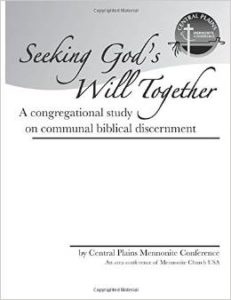 How do we discern the way of Jesus as we engage the culture we find ourselves in? This is a question that many Mennonite Church USA congregations might be asking themselves. And it’s also the question that a new study, developed by Central Plains Mennonite Conference, seeks to address.
How do we discern the way of Jesus as we engage the culture we find ourselves in? This is a question that many Mennonite Church USA congregations might be asking themselves. And it’s also the question that a new study, developed by Central Plains Mennonite Conference, seeks to address.
Seeking God’s Will Together is a resource that teaches congregations how to practice communal biblical discernment, or put more simply, how to read and interpret the Bible together and apply it to their daily life. This resource includes six sessions, that can be worked through over several weeks or months. Each session begins and ends with a prayerful ritual in which participants “lay down” their own hopes and desires, while also inviting God to reveal God’s will. Each unit includes a teaching video, scripture passages and questions to guide communal Bible study, and suggestions for how to put into practice tools for communal discernment. Depending on the congregation or group’s preference, each unit can be split into two sessions, the first exploring the teaching materials and the second focusing on praxis. Each unit takes a minimum of 90 minutes, so a congregation can do the study in six 90-minute sessions or twelve 50-minute sessions.
“We live in complex times,” said David Boshart, Central Plains executive conference minister. “In the face of rapid societal change, the church is challenged to witness in the world with increasing clarity and nuance…This study addresses why the church practices discernment, teaches specific practices of discernment, and gives congregations opportunities to practice what they have learned. After completing the study, congregations and our conference as a whole will be well-positioned to carry out faithful biblical discernment in ways that will foster unity even when members disagree.”
The six units are as follows:
Session 1: Seeking God’s will together: Why do we do it? Central Plains Executive Conference Minister, David Boshart, offers insights on why we practice discernment. The practice session teaches an inductive method of Bible study.
Session 2: By what authority? Amanda Beachy, pastor at Washington (Ia.) Mennonite Church, teaches about the role of the Bible in discernment processes. The practice session offers two more methods of communal Bible study.
Session 3: How do we read the Bible? Conference Minister Shana Peachey Boshart gives an overview of tools for reading the Bible, drawing on the book, The Art of Teaching the Bible, by Christine Eaton Blair. The practice session introduces five questions for discerning what God is saying through scripture.
Session 4: Can we agree? Matt Troyer-Miller, Pastor at Wood River (Neb.) Mennonite Church and Nathan Ramer, pastor at Wellman (Ia.) Mennonite Church, focus on how the instructions Jesus gives us in Matthew 18 apply to the church today. The practice portion focuses on speaking and listening skills that equip us to carry out Jesus’ instructions.
Session 5: When we don’t agree. David B. Miller, of Anabaptist Mennonite Biblical Seminary, teaches from Romans 14 and 15, and Elizabeth Troyer-Miller, of Wood River (Neb.) Mennonite Church, teaches about congregational dynamics regarding conflict. The practice session combines reflection on your own congregation’s history with further study of Romans 14 and 15.
Session 6: Inviting the Spirit to lead us. The final session is full focused on practicing new skills on a topic for discernment chosen by your congregation. The topic should be chosen carefully, so that the congregation or group can practice these processes on a topic that matters, but isn’t divisive.
So far, congregations that have used the study have been enthusiastic about its effect on the congregation. Vicki Biggerstaff facilitated the study at Sermon on the Mount Mennonite Church in Sioux Falls, South Dakota. Pastor Christopher Montgomery wrote, “The congregation is preparing to enter a season of vision discernment and strategic planning later this year, so this study is functioning as a good launching point for us.”
Seeking God’s Will Together was written by a team of Central Plains pastors led by Peachey Boshart. The team developed the study through weekly web conferences over five months. Session writers are Nick Detweiler-Stoddard, pastor of Salem Mennonite Church in Freeman, S.D., Amanda Beachy, Nathan Ramer, and Matt Troyer-Miller.
“It was exciting being a part of this team,” said Ramer, “because even though the task was daunting, the issues that the team were asked to engage are such a central need of the church right now and I wanted to be a part of addressing that.”
Congregations wishing to use this resource can purchase a print copy of the guide online at Amazon.com. In addition, the video teaching sessions are available at the Central Plains Mennonite Conference website. Congregations desiring a DVD including all of the teaching sessions should e-mail Peachey Boshart directly.

